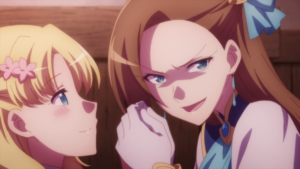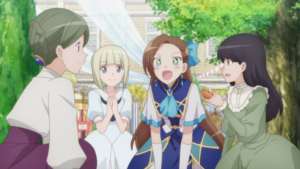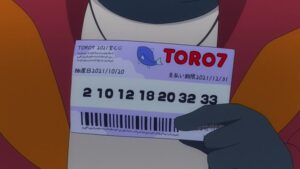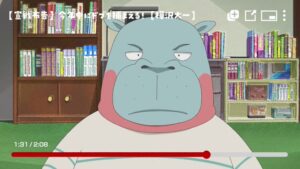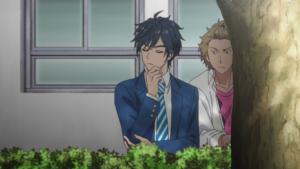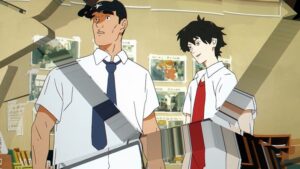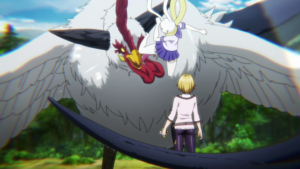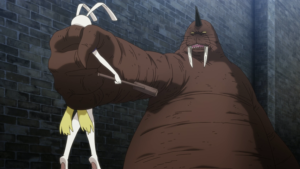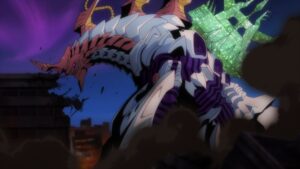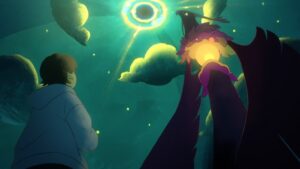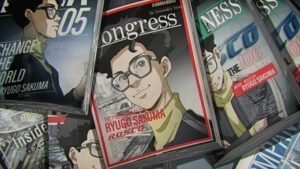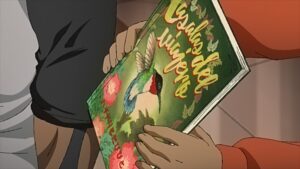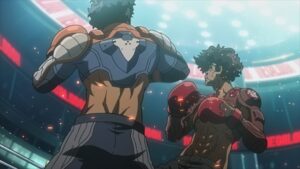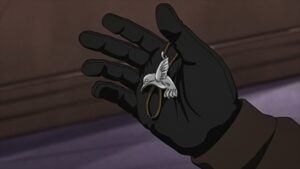Hamefura S2
Short Synopsis: A reincarnated high schooler finds out she’s the villain of her favorite game and feels safe, having avoided all of her doom flags.
Mario: Our poster girl is back for another season. As much as my heart screams “YES”, to be completely fair, this premiere will satisfy fans but offer little to change distractors’ minds. Part of the reason why is that it rehashes the formula from the first season: Bakarina just goofs around while other guys (and gals) fawn over her. It’s a prime example of characters running around in search of plot since there’s no real urgency at the moment. To add to that, the characters are not distinct enough solely because they all have the same attitude and feeling towards Katarina. Maybe that’s why I enjoy the red-haired dude the most since he is the only one who isn’t crazy about her. As long as the show fixes these two issues I can see it becoming a force to be reckoned with. If not, well, at least we always have Bakarina.
Potential: 50%
Amun: Season 2 of Hamefura was always going to have a problem: what happens when the central conflict, actually the central premise, of the show is resolved? From this first episode, the answer seems painfully clear – instead of avoiding exile or death, our heroine/villainess now must avoid another sentence – marriage. I’m expecting an expanded cast as well – we’ve already met some brothers and introduced the idea of the Magic Research Institute or equivalent institution. This sounds like I’m being pessimistic – which I am – but the first episode still hit all the fun notes and made me laugh just like the best bits of the previous season. I don’t think the magic’s lost, but I think there are going to be some challenges towards the back half of the season. That said, Hamefura has a long way to fall before I drop it – especially considering the other prospects this season.
Potential: 75%
Bokutachi no Remake
Short Synopsis: A wannabe game developer gets a second chance at his dream career after traveling ten years into the past.
Wooper: As soon as I booted up this hour-long premiere and saw the slow crawl of the progress bar, I braced myself for a bad time, but Bokutachi no Remake was merely mediocre. The premise wasn’t too far-fetched for a time travel anime, as the lead character doesn’t use his knowledge of the future to his advantage – he’s just making the most of the mysterious opportunity to redo his college years. Actually, you could argue that the show’s normalcy is its biggest issue. The script is overflowing with safe conversations between students and teachers, which seem designed to pad out a double-length episode rather than illuminate their personalities. Even the protagonist’s reactions to the fanservice scenes seemed a tad too mild (though anime has poisoned the part of my brain that evaluates that stuff). A semi-realistic look at art college isn’t far from my sort of show, but despite the series’ low key atmosphere thus far, I don’t think I’ll continue with it – the aggressively cute female characters and the superficiality of the classes don’t hold a lot of interest for me. Still, there’s a chance that Remake will deepen its scope as it goes, so if you enjoyed this premiere, don’t let me put you off.
Potential: 40%
Lenlo: Bokutachi is… rather dull to be frank. I was rather interested in the beginning! We don’t get enough anime following adult characters and I think the struggle not only to find a job but to manage a videogame project, ala Shirobako, could have been really interesting! But then it decided to go down the time travel route. And I don’t know about you but between Erased and the recent Tokyo Revengers I’ve been burned more than I would like by time travel anime. They so often fall into the common pitfalls of time travel, namely that half-assed writing/adaptations fall apart where in regular series they could coast. Bokutachi has one advantage in that it’s going back to college instead of high school or middle school but overall I’m just not that interested in another time travel “Fix my past mistakes” series. I don’t want to watch people fix those mistakes! I want to watch people recognize and overcome those mistakes!
Potential: 20%
Mahouka Koukou no Yuutousei
Short Synopsis: Viewers can now see the glory of One True Tatsuya from the perspective of his biggest fan – his sister.
Amun: Irregular at Magic High has always had two primary characters and an otherwise forgettable cast. This episode was…exactly what two seasons of this universe would have you expect, so I’m not going to dwell on that too much. What’s more interesting to me is the ED, which seems to indicate a more sports-themed focus on the minor characters. It also seems that the little sister is the narrator this time around – which I absolutely couldn’t care less about. I guess that means the female side characters will have more screen time? Last season started tackling issues that I felt were a little too large (literal multiverses) to be taken seriously, so I’m glad this season (which is something of a prequel? I think?) will be getting back to small-scale silliness. I still like this world and it’s a fun romp of power-magic fantasy with pretty characters, so I’m onboard. Just don’t hurt yourself thinking too hard about the plot – this isn’t that kind of show.
Potential: 65%
Wooper: I must be getting soft in my soon-to-be-middle age. The sort of dumb anime bullshit that used to get on my nerves only makes me laugh these days. And just like its parent series, this Mahouka Koukou spinoff is positively dripping with dumb anime bullshit; incest bait, protagonist worship, and obsession with female purity all made appearances in this single episode. This thing is written by and for dudes whose contact with women is limited to their immediate family members (who had better dress modestly whenever they set foot outside the house). But as I said earlier, I’m a changed man – these are no longer disqualifying factors in my mind, just distractions from whatever larger appeal a show might have. Just because anime as a whole is overrun with cardboard characters and busty babes doesn’t mean it can’t be enjoyed for its better qualities! So the question is, barring Miyuki’s lustful narration, Tatsuya’s crowd-moistening sophistication, and all that evil female flesh on display, what is the appeal of this franchise?
Appeal: 0%

